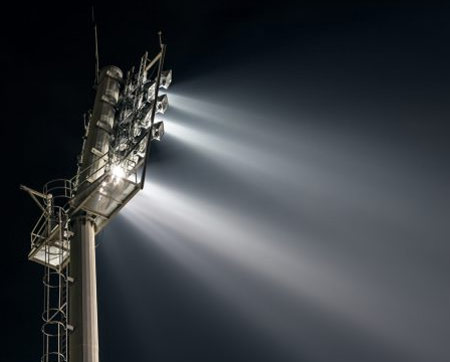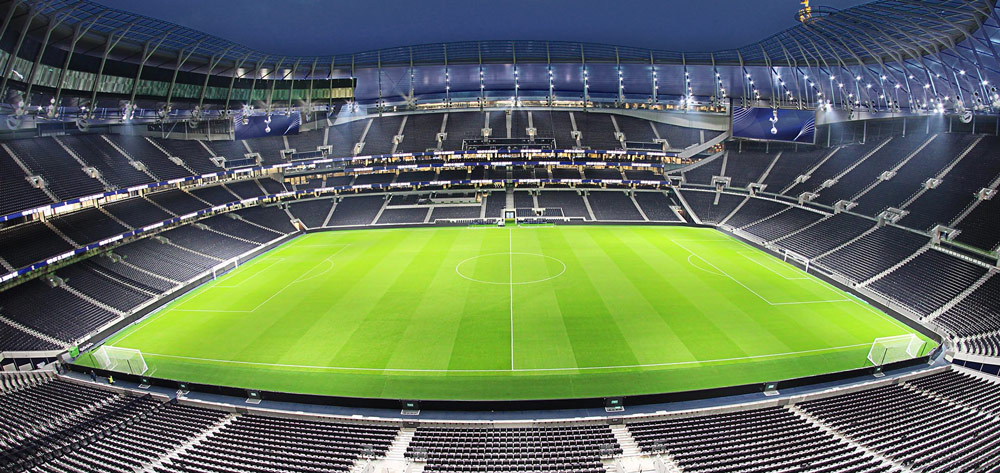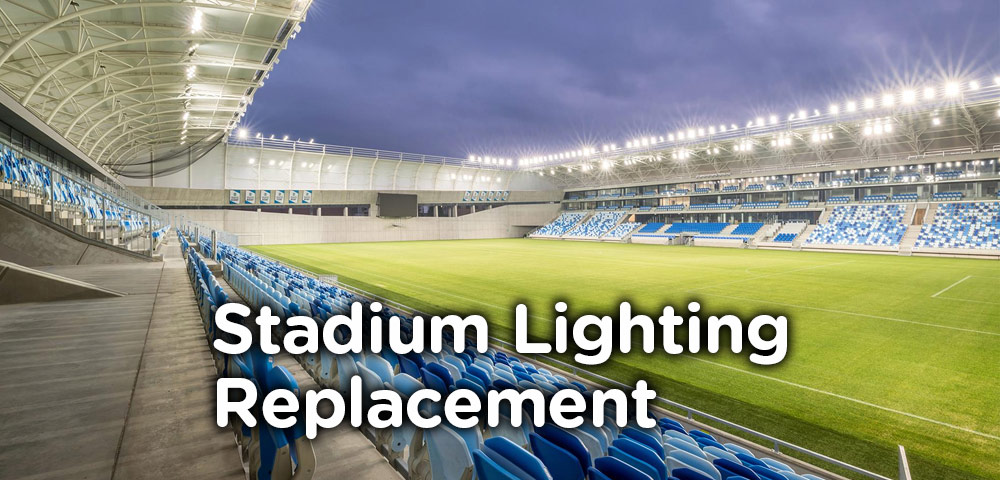Are you planning to replace 1000W, 2000W or even higher wattage metal halide or halogen stadium lights? There are many advantages to do so. For instance, you can save the running cost and maintenance cost of stadium lighting because LED is more energy efficient and durable. Let’s take a look at how to replace the MH and halogen bulbs with LED.
Why should we replace metal halide stadium lights?
1. UV emission
 Due to the characteristic working principle of metal halide, not only visible light but UV light is generated. This is because the electron excitation process is not selective – we can’t control it to emit visible light only. The excessive amount of UV light may be harmful to skin, so we should avoid metal halide in the sports stadium. Especially we are using 1000W or even higher wattage of metal halide lights, the UV light intensity will be very high.
Due to the characteristic working principle of metal halide, not only visible light but UV light is generated. This is because the electron excitation process is not selective – we can’t control it to emit visible light only. The excessive amount of UV light may be harmful to skin, so we should avoid metal halide in the sports stadium. Especially we are using 1000W or even higher wattage of metal halide lights, the UV light intensity will be very high.
To improve this, we can make use of LED lights. This is because LED lighting has the completely different mechanism – using semi-conductor to give out visible light only. Therefore, we can see LED lights for stadium is more advanced, and it is worthwhile to replace the metal halide light bulbs with LED flood lights.
2. Mercury leakage
Do you know metal halide lamp contains a certain amount of mercury vapor? Mercury is needed because we make use of the vaporized mixture to generate electric arc, which is the fundamental working principle of metal halide lighting.
Right, if the luminaires are accidentally broken with the fast-moving football or baseball, chances are that the toxic mercury leaks to the stadium audience seats that causes disastrous consequence.
By upgrading the stadium lights to LED, we can eliminate this risk because LED lights won’t contain such the toxic substance.
3. Less energy saving
Why should we convert metal halide stadium lights to LED? Another major incentive is to save energy cost. Since LED lights have higher luminous efficacy than metal halide lights, LED can generate brighter lights if LED and MH lights have the same power rating. Especially when we are going to light up the gigantic stadium, we can save around 50 to 75% energy consumption after replacing the 1000W to 2000W metal halide stadium lights by LED. You will see the dramatic difference on the electricity bill after the replacement.
| Metal halide | LED equivalent* |
| 1000W | 300W to 600W |
| 2000W | 500W to 1200W |
* Actual value depends on the luminous efficacy of metal halide lamps
Contact our representatives to get the free stadium lighting replacement tips and design.
See also: Pros & cons of upgrading high school stadium lighting to LED
4. Limited range of color temperature
To fulfil the FIFA international standard of football stadium lighting, we may need to use the specific color temperature in various circumstances. The color temperature of our LED lights can be customized from 2800 to 7500K that perfectly suits your need, which is better than metal halides that have the limited color temperature range.

Why should we replace halogen bulbs for sports stadium?
1. Excessive heat given out
Halogen bulb can easily heat up the stadium, so the football players and audience may feel discomfort particularly in summer. To light up the halogen bulb, the filament inside the bulb is needed to be heated up to thousands of degrees to generate visible light. However, LED doesn’t require this heating up process, so we can keep the stadium cool after the halogen replacement.
2. Short life span
If you are using halogen bulbs in the stadium, you may find it is fairly painful to replace the bulbs from time to time. You will need to do so because each halogen bulb lasts for only 1000 to 3000 hours, which is quite similar to incandescent bulb. Apart from wasting money to buy the new 1000W or 2000W halogen bulbs, we also need to spend much on installation. Nevertheless, using LED lights can greatly improve this.
Our stadium LED light has the much longer life span of 80,000 to 100,000 hours. Replacing the halogen lights with LED can definitely save your subsequent installation cost, so you can allocate much resource in other part of the stadium.
3. Easy to break
Most halogen bulbs are consisted of grass and other delicate parts, the fast-moving football, cricket or tennis balls may easily break the halogen bulbs. We can say the halogen bulb is less resistant to shatter, particularly when we are using the lamps in the stadium. Having the durable lights can also improve the stadium security.
On the contrary, LED is more durable and resistant to break as the LED chips are covered by the sturdy polycarbonate lens or other transparent material. These lighting fixtures, and thus, can even resist the strong impact inside the stadium.
4. Sensitive to touch
Interesting, it is not recommended to touch the surface of the halogen bulbs. One of the reasons is that you may easily get burnt as the surface of the grass is extremely hot after turning the halogen bulb for a while. Another important reason is that the oil of our fingertip may leave on the bulb surface. The oil will slightly alter the imbalance of the grass, and thus cause the bulb to break suddenly.
However, we don’t need to worry about this after replacing the 1000 to 2000W halogen bulbs with LED stadium lights. This is because we use polycarbonate lens instead of grass to cover the light source. LED is also much cooler to touch.
Tips on How to Replace Stadium Lighting (Metal halide to LED or Halogen to LED)
1. Wattage & lumen of LED stadium lighting replacement
The first and foremost things we need to consider is the power of the LED lights for replacing the metal halide or halogen lights. The simplest way is to look at the lumen of the existing metal halide or halogen lights. For instance, if each 2000W MH lights have 70,000 lumens, we can use the LED lights having the similar lumen output to replace it. As our LED lights have 170 lumens per watt, we can use 400W LED to replace 2000W this MH lamps. However, it is not the same in other cases because we have to look at the actual lumen output of the luminaires and compare it with the new ones.
The most important fact is that the lumen indicates the brightness of the lamps, while the wattage just represents the power consumption. Different light types (LED, halogen, metal halide) have different luminous efficacy, so we should ask the sports lighting contractors before buying. Even for the same lights source says LED, they would have different models having different lighting efficiencies within the company. Remember, never just look at the power consumption of the lights.
2. Weight limitation on light poles or roof
After selecting the right LED lumen to replace the MH stadium lights, we have to deal with the weight of the luminaires. Some companies may offer you the extremely heavy LED lights. If the weight of the lamps exceeds the safety standard, it may be quite dangerous as they may fall during the football of baseball matches. Especially we are using the 2000W, 4000W or even 5000W LED lights in the football field or cricket stadium.
Thus, if you are going to retrofitting or upgrading the stadium lights, we need to ask the sports lighting company, and compare the weight of the old and new lamps. The safest approach is to use the light-weight luminaires on the light poles or the stadium roof.
See also: Cricket stadium lighting buyer’s guide and tips
3. Beam angle of stadium lighting
Another important aspect of stadium lighting replacement is the beam angle, which greatly affects the lighting uniformity of the football field. If the stadium flood lights have large beam angle, the light beam will be spread and more diverged. However, if the beam angle is too large, the lights cannot travel in a long distance, so majority of light beam will be scattered before reaching the ground. Thus, we need to have the careful and precise arrangement of each lighting. 1000W and 2000W LED lights having 10 to 25 degrees are the common beam angles for sports field. Contact us to get the free lighting design today.
4. Light color
A way to describe the light color is using the color temperature. Normally we will use 5000K to 6000K lighting in the baseball stadium, cricket stadium, football stadium, etc. The 5000K lighting can provide the natural daylight feeling which is better for sports players. However, if the color temperature is too high, the blue light intensity will increase.
5. Lighting control system
DMX and DALI are the mainstream stadium lighting control system. The general is that we can connect dozens of luminaires together and manipulate the brightness, on/off in an integrated control panel. Sometimes we can use both DMX and DALI in the same venue to achieve the best lighting outcome.
6. Price
Price is always the big concern when replacing the stadium lights. If you happen to ask different sports lighting contractors, you may find that the price of LED light is higher than metal halide or halogen bulbs. However, aside from the initial cost (the lamp cost), we also need to consider the future running & maintenance cost.
If you have a really tight budget, we can even try to get the used stadium lights as the price is usually cheaper. However, we need to check the remaining life span of the lights. And we can’t get the customized lights for the stadium as each venue is unique. If you want to get the best lighting, it is advised to get the new lamps because we can have the customized wattage, lumen, beam angle, color temperature, & weight.

